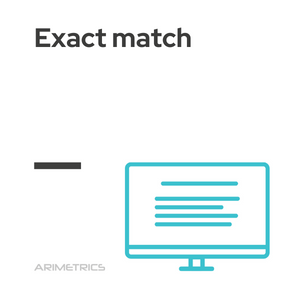Definition:
Exact match
is a type of Google Ads match that allows you to show an ad when a user searches for the exact words or words that are indexed to the account of the ad account. An exact match keyword will cause the Google Ads ad to only trigger on an exact match search.
Examples of exact match
If the keywords are written in the account in square brackets, e.g. [balón de fútbol]If a user searches for the specific phrase soccer ball, in this order, and without any other terms in the query, an ad may appear. For example, the ad will not be displayed for soccer ball for training or soccer ball. Exact match is the option that is most directly addressed to the user.
Even though not as many impressions are received with exact match, the clicks received are likely to be more desirable, as they are more specific: users searching for the general exact keyword will want precisely what this ad has to offer.
Exact match is the only type that does not require the use of negative keywords.
Changes in Google Ads and exact match (2021)
In recent years, Google has made several significant changes to its advertising platform, especially in the way keywords and matching are handled. Historically, exact match allowed advertisers to display their ads only when a user performed a search with the exact words specified. However, recent updates have led to greater flexibility in how these matches are interpreted. With the new settings, and as early as 2021, Google has expanded the definition of exact match to include close variations of keywords. This means that ads can be triggered not only for the exact phrase, but also for searches that include synonyms, word variations, or even typos. For example, if the exact match keyword is [balón de fútbol], the ad could be displayed for searches such as “soccer balls” or “soccer ball”. This change has important implications for advertisers. On the one hand, broadening exact match can increase the number of impressions and clicks, allowing ads to reach a wider audience. However, it can also result in less precision in targeting, which could lead to ads being shown to users who are not searching for exactly what is being offered.

